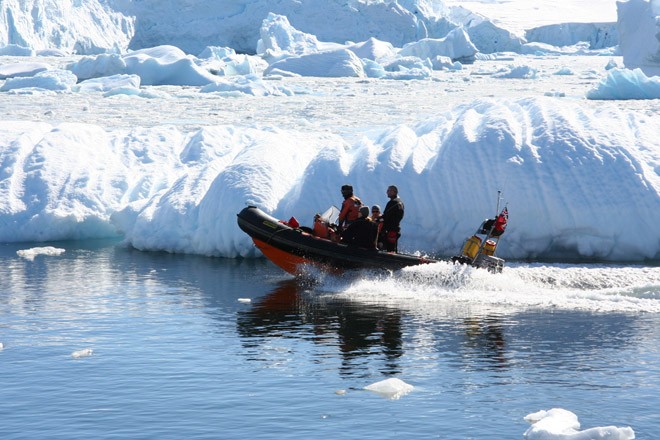The effects of ocean acidification on shellfish
by British Antarctic Survey on 12 Aug 2012

Boating to a dive location from Rothera Research Station in the Antarctic Sue-Ann Watson
An international study to comprehend and predict the likely impact of ocean acidification on shellfish and other marine organisms living in seas, from the tropics to the poles, has been published this week in the journal Global Change Biology.
Ocean acidification is occurring because some of the increased carbon dioxide humans are adding to the atmosphere dissolves in the ocean and reacts with water to produce an acid.
The results suggest that increased acidity is affecting the size and weight of shells and skeletons, and the trend is widespread across marine species. These animals are an important food source for marine predators such as tropical seabirds and seals as well as being a valuable ingredient in human food production. Consequently, these changes are likely to affect humans and the ocean’s large animals.
UK scientists from the British Antarctic Survey (BAS) and the National Oceanography Centre (NOC), together with colleagues from Australia’s James Cook and Melbourne Universities and the National University of Singapore, investigated the natural variation in shell thickness and skeletal size in four types of marine creatures living in 12 different environments from the tropics to the Polar Regions. Their aim was to get a clearer understanding of similarities and differences between species, and to make better predictions of how these animals might respond to increasing acidity in the oceans.
The effort required by clams, sea snails and other shellfish to extract calcium carbonate from seawater to build their shells and skeletons varies from place to place in the world’s oceans. A number of factors, including temperature and pressure, affect the availability of calcium carbonate for species that produce carbonate skeletons.
There is already evidence that ocean acidification is affecting the ability of some marine species to grow, especially during their early life stages, and there is mounting concern about whether or not these species can evolve or adapt to cope with increases in acidity in the coming decades.
This study shows, over evolutionary time, animals have adapted to living in environments where calcium carbonate is relatively difficult to obtain by forming lighter skeletons. Carbon dioxide from fossil fuel combustion is altering seawater chemistry in the same way, in a process called ocean acidification and this is making it harder for marine animals to make shells and skeletons.

Polar sea urchin from the Antarctic, Sterechinus neumayeri (Photo: Sue-Ann Watson)

Polar sea snail from the Arctic, Buccinum glaciale (Photo: Sue-Ann Watson)

Temperate sea snail from the UK, Buccinum undatum (Photo: Sue-Ann Watson)
The four different types of marine animals examined were clams, sea snails, lampshells and sea urchins. Scientists found that as the availability of calcium carbonate decreases skeletons get lighter and account for a smaller part of the animal’s weight. The fact that same effect occurs consistently in all four types suggests the effect is widespread across marine species, and that increasing ocean acidification will progressively reduce the availability of calcium carbonate.
Professor Lloyd Peck of British Antarctic Survey said, “This effect is strongest at low temperatures and the results showed polar species to have the smallest and lightest skeleton, suggesting that they may be more at risk in the coming decades as the oceans change. Interestingly, where ecology requires animals to have strong skeletons - for instance to protect them from impacts from floating ice in Antarctica - skeletons are made thicker and stronger. However, they still form a smaller part of the animal’s body mass, because the shape of the species changes to enclose much more body for a given amount of skeleton. Thus life finds a way, but still follows the overall trends of decreasing skeleton size in areas where the ocean chemistry makes it more difficult to obtain the necessary building blocks. If there is time for species to evolve in temperate and tropical regions it is one way they may be able to overcome some of the future effects of ocean acidification.”
Dr Sue-Ann Watson, formerly of the University of Southampton and British Antarctic Survey (now at James Cook University) said, “In areas of the world’s oceans where it is hardest for marine creatures to make their limestone shell or skeleton, shellfish and other animals have adapted to natural environments where seawater chemistry makes shell-building materials difficult to obtain. Evolution has allowed shellfish to exist in these areas and, given enough time and a slow enough rate of change, evolution may again help these animals survive in our acidifying oceans.”
This research was funded by the Natural Environment Research British Antarctic Survey website
If you want to link to this article then please use this URL: www.sail-world.com/100890